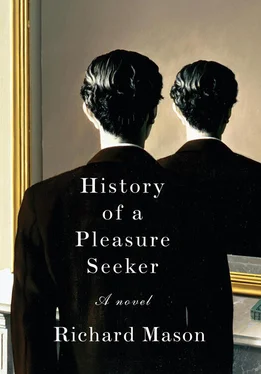Egbert never knew how the Number came to him. He did not choose it. He had no idea Who was responsible for its emphatic selection, but every morning as the door to his great-aunt’s house closed behind him, he heard it loud and clear. This morning it was 495. He was relieved. On days when it was above 1,200, he could not get to his piano before lunch. Sometimes he was not able to reach it at all. On these days he had to plead illness and return to bed. But 495 was manageable in three hours, even if he stumbled.
The forces to which Egbert Vermeulen-Sickerts paid his obeisance every day were expressed in the tangible world chiefly through the colors white and black, though they lived in shades of light and darkness too. He called them the Shadowers and they hated one another hysterically. If he did not divide his attention equally between them, a vicious mob-whispering broke out in his head and pronounced terrible punishments.
The Number governed the number of steps in the abasement he was obliged to perform each morning. The precise order of the colors derived from long memorized runs in the preludes and fugues of J. S. Bach, as played on his great-aunt’s piano. They found literal expression in the black and white tiles of her entrance hall floor.
Egbert stepped across the tiles, swiftly touching four white ones in succession, then a black one, then another six whites. He moved rhythmically, backwards and forwards, up and down the entrance hall, his face tense with concentration. He heard the clock chime the quarter hour, then the half hour; then it was six a.m., and he heard unmistakable sounds of life coming from his own house.
On the 211th element of the sequence, he misjudged a leap and grazed a black tile when he had been aiming for a white one. Sweat broke out on his forehead. His mother had told him that Mr. Barol would be down at eight, and now he’d have to start all over again. He did so. This time he got to the 420th without error, but again he made a mistake and had to start at the beginning. By seven-thirty he was exhausted, going slowly for fear of a final error from which there would be no time to recover, but by a quarter to eight he had only reached the 193rd tile and was beginning to despair. A crazy recklessness seized him. He did not want to spend the day in bed, feigning illness, and couldn’t possibly be found by his new tutor in this compromising position.
Like his father, Egbert was deeply private about his interior afflictions. He had never told anyone of the tyranny of the Shadowers and did his best to disguise his state of bondage from those who loved him. The infinite shades of light on the leafy street outside were so daunting, the possibility of navigating them so slim, that he had found it easier to face his father’s wrath than rise up against his oppressors. He began to go faster and faster. Sometimes he spent all day like this. Sometimes he made seven mistakes: the maximum permitted, which required the taking of seven ice-cold baths in expiation. He had reached the middle of the volume of preludes and fugues when he heard voices in the dining room. His father had come down to breakfast. He was now trapped. Retreat was impossible until Maarten left for work, because he would neither credit nor sanction a convenient fever or sore throat. And by the time his papa had left, Mr. Barol would have found him.
Egbert began to dart across the tiles in a frenzy, faint with hunger and commitment. Fortune was smiling on him and detained Piet for several minutes with his employer in the breakfast room. He heard Mr. Barol’s rich warm laugh and continued his leaping, ending the sequence on a white tile by the drawing room door. He went through it, panting, and threw himself into the final stage of his odyssey.
Piet Barol had not slept well. He was furious that Louisa Vermeulen-Sickerts should have seen through him, and said so for Didier Loubat to hear. As he washed his face he felt inclined to hate her. But it was the refuge of lesser men to hate and he refused to stoop to it. He resolved instead, as he knotted his tie, to make Louisa like him in spite of herself. That was the worthy challenge. But before it could be attempted there was the question of his new pupil, on whom a first impression remained to be made.
He heard Egbert as soon as he opened the door in the dining room wall. The boy was playing Bach with maniacal precision, and Piet stood in the entrance hall listening with admiration. It was clear that Egbert was already a far better pianist than Piet would ever be; there was nothing he could teach him on that score. He wished that Jacobina or Maarten were present to introduce them, but Maarten had instructed him to present himself alone. Piet hesitated. He did not much like Bach, and the boy’s relentless repetition of the prelude did not inspire any new affection. He listened a few moments longer, then knocked at the drawing room door and opened it with his friendliest smile.
Egbert was at the piano, with his back to him. Piet coughed. Egbert did not stop or turn around: he was on his fifth repetition, and if he did not complete two more the strenuous efforts of the morning would be wasted.
“Good morning,” said Piet. But still he was ignored. The music rattled on and on, came to an end and began again. Piet was nonplussed. His strategy, in so far as he had one, involved gaining his new pupil’s trust and regard. He did not wish to begin their acquaintance with an undignified tussle for attention. At some point he will have to stop, he thought. And indeed, a few minutes later, Egbert did stop.
“Good morning,” said Piet for the second time, “and bravo.”
“Good morning, sir.”
There was a table by the window. Egbert took his place at it with the slow indifference of an experienced criminal who intends to give nothing away under interrogation. He could not manufacture his sister Constance’s warmth and unlike Louisa, who was also naturally taciturn, he had no boisterous sibling to shelter behind. He wished desperately to impress Mr. Barol, but the fear of not doing so made him behave with an hauteur learned from his elders, which was deeply unattractive in a ten-year-old boy who will one day be the possessor of a large fortune.
“We’ll start with French grammar,” said Piet, rather coldly. “Are you familiar with the subjunctive mood?”
“Yes, sir.”
“Decline, then, if you please, the present, future and imperfect subjunctive forms of avoir .”
Egbert did so, faultlessly. He also translated that morning’s leader in the Algemeen Handelsblad into accurate, idiomatic French; and then into German of lesser but acceptable quality. They moved from this to still-life drawing, and here there was something Piet could teach him, for Egbert failed utterly to capture the supplications of a vase of tulips in the last stages of their glory. They worked for an hour or more on this challenge; then Piet said, with careful nonchalance, “It’s very hot in here. Why don’t we go outside and find another subject?”
But a stiffening of Egbert’s posture and a stubborn glazing of his expression told Piet he was alive to such simple tricks. Piet’s head was feeling delicate and he did not press the point. He rang for coffee. An urn of water was kept permanently at boiling point in the kitchen of Herengracht 605 and four minutes later Hilde Wilken knocked at the door and bowed, caught Piet’s eye, and smiled and poured and bowed again — just as Didier had said she would. The impact was marvelous. He set Egbert one of Pliny’s most rambling letters to translate into Dutch and removed himself to a comfortable armchair with the papers. The room was a trifle gaudy but there were worse places to spend a morning. As Egbert worked, Piet’s good spirits reasserted themselves.
Читать дальше












